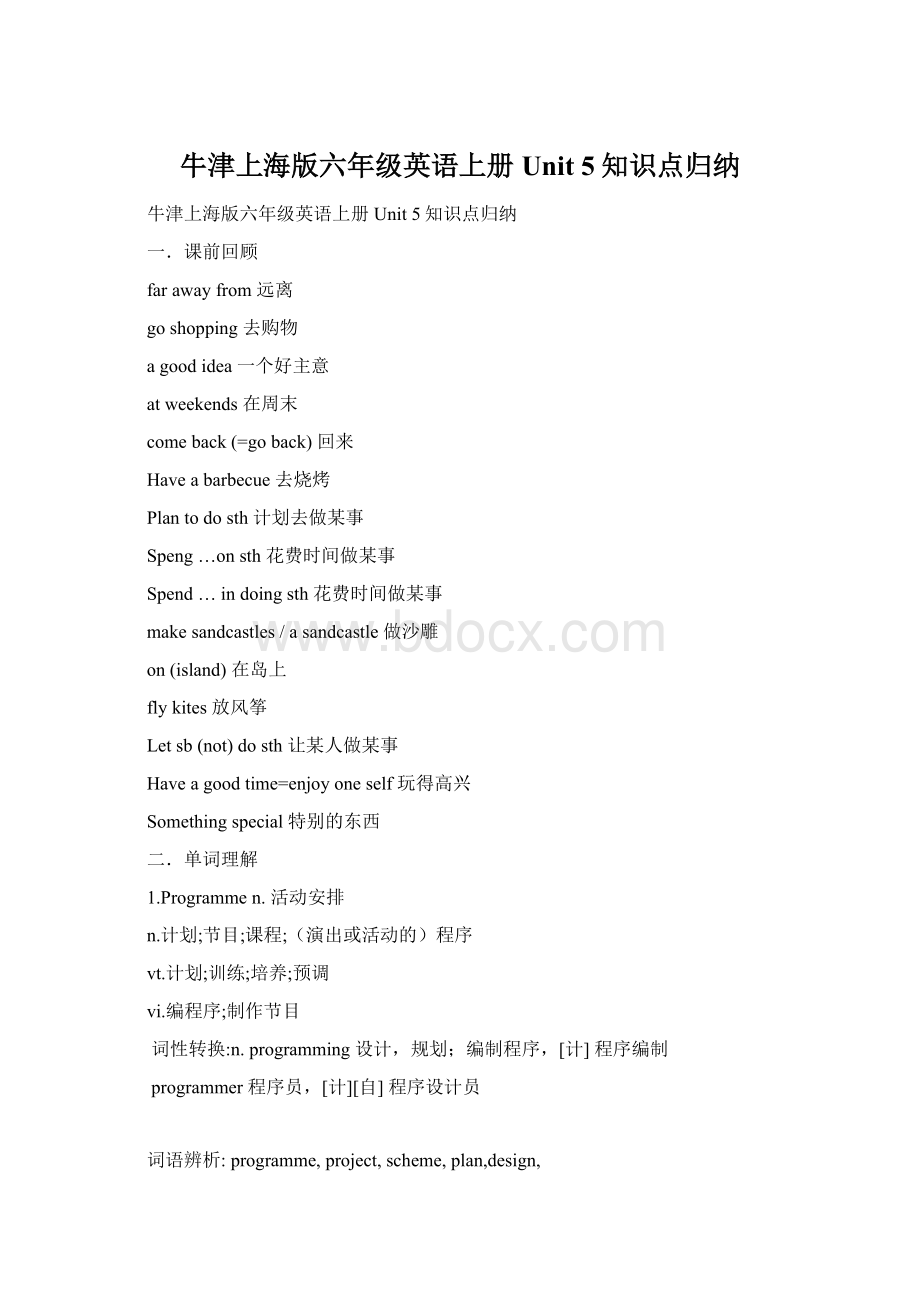牛津上海版六年级英语上册Unit 5知识点归纳.docx
《牛津上海版六年级英语上册Unit 5知识点归纳.docx》由会员分享,可在线阅读,更多相关《牛津上海版六年级英语上册Unit 5知识点归纳.docx(17页珍藏版)》请在冰豆网上搜索。

牛津上海版六年级英语上册Unit5知识点归纳
牛津上海版六年级英语上册Unit5知识点归纳
一.课前回顾
farawayfrom远离
goshopping去购物
agoodidea一个好主意
atweekends在周末
comeback(=goback)回来
Haveabarbecue去烧烤
Plantodosth计划去做某事
Speng…onsth花费时间做某事
Spend…indoingsth花费时间做某事
makesandcastles/asandcastle做沙雕
on(island)在岛上
flykites放风筝
Letsb(not)dosth让某人做某事
Haveagoodtime=enjoyoneself玩得高兴
Somethingspecial特别的东西
二.单词理解
1.Programmen.活动安排
n.计划;节目;课程;(演出或活动的)程序
vt.计划;训练;培养;预调
vi.编程序;制作节目
词性转换:
n.programming设计,规划;编制程序,[计]程序编制
programmer程序员,[计][自]程序设计员
词语辨析:
programme,project,scheme,plan,design,
programme
使用广泛,既可指思想上的计划,又可指任何形式的书面计划或规划。
project
多指由个人或集体为进行某项工作或完成某一项较大的任务,而制定的计划方案或设想。
scheme
普通用词,比plan更强调计划的通盘筹划。
在现代英语中,常用于指阴谋诡计。
plan
最普通常用词,多指事先经过较充分的准备后制定的计划,也可指非决定性的打算或设想。
design
侧重指按照目标、目的意向,根据固定格式精心作出的计划或安排。
例句:
Thebroadcasterbitoffthemusicprogramme.广播电台中断音乐节目。
Theprogrammewouldabendafterthethirdline.程序在第三行以后会异常终止。
Thatwasahealthprogrammetobenefiteveryone.那是一项对人人都有好处的健康计划。
Yesterday'sprogrammewasratherdul
2.arrivev.到达;成功;达成;出生
短语:
arriveat达到,达成;到达某地
arrivein抵达,到达
arrivefrom从某地来(这里)
arriveon到达
arrivehome到家
arriveataconclusion得出一个结论
arriveatadecision决定下来
toarrivelate迟到
词性转换n.arrival到来;到达;到达者
arriver到达者
词语辨析:
arrive,attain,reach,achieve
arrive
指得出结论,达成某项协议或作出某一决定等。
attain
侧重指在抱负或雄心的激励下,以最大的努力去达到一般所不及或不敢追求的目的。
reach
常用词,指到达某一空间、时间、目标或发展过程中的某一点。
achieve
侧重为达到目的所需的技巧、忍耐和努力。
arrive at后接小地方 arrive in 后接大地方
e.g.I arrive at school at 7:
15.
He will arrive in Shanghai at two o’clock.
例句:
Wemustcleartheroombeforeourguestsarrive.我们必须在客人到达之前把房间收拾好。
Workersinafactorymustclockinwhentheyarrive.工厂工人到达工厂时必须记录上班时间。
YoumusthookupwithMr.Ordwayonceyouarrivethere.你一到那儿必须马上与奥德韦先生联系。
3.projectn.习作;项目工程;计划;事业
vi.设计;计划;表达;投射
vt.设计;计划;发射;放映
短语:
advancedproject已提出的计划;远景规划;尖端研究计划
projectoneself突出自己;表现自己;使自己显得像…
projectoneselfinto设想自己处身于
projectsomethingontosomeone以己之心度人之腹;设想某人怀有和自己一样的感情(或想法)
词性转换:
adj.projecting突出的;伸出的
n.projection投射;规划;突出;发射;推测
projector放映机;探照灯;设计者
projectionist放映员;电视技师;地图绘制员;电影放映师
v.projecting使突出(project的现在分词);计划;发射
例句:
Pleasecountmeinonthisproject.请把我也算入这项计划的参加者。
Thisprojectinvolvesmuchdifficulty.这一项目有许多困难。
Iwanttointerestyouinournewproject.他想让你热心于我们的新项目。
三.词组学习
1.an Open Day 一个开放日
2. Open day programme 开放日活动安排
3. an entrance 一个入口处
4. listen to a choir 听一个合唱队(唱歌)
5. a noticeboard 一块布告栏
6. my parents 我的父母亲
7. meet sb. at the entrance 在入口处迎接某人
8. arrive in + 大地方 到达一个大地方
9. arrive at + 小地方 到达一个小地方
10. visit the classroom 参观教室
11. First, … /Next, … /Then, …/ After that, …/ Finally, … 首先,紧接着,然后,在那以后,最后
12. look at our class projects 看一看我们的班级习作项目
13. in the Arts and Crafts room 在美术劳技室
14. in the hall 在大厅里
15. our English Club 我们的英语俱乐部
16. have tea and cakes 喝茶吃蛋糕
17. in the Music room 在音乐室
18. welcome the parents on the Open Day 在开放日欢迎父母
19. in different places 在不同的地方
20. on the ground floor 在第一层(英式表达法)
21. write an invitation 写一封邀请函
22. take some photos 拍一些照片
23. have a great/good time 过得愉快
例题与练习:
根据所给中文完成下列句子
1.Yourparentswill______________________.(在下午三点钟到达)
2.Doyouwantto___________________.(参观我们的教室)
3.Theteachers’officeis_____________________.(在一楼)
4.Theyare______________________.(听学校合唱团)
5.Thisisour_______________________.(学校英语俱乐部)
6.Comeand________________________.(见见我们的英语老师)
7._________________(同学们),doyouwanttolookatourprojects?
8.Didyou__________________(玩得高兴)thatafternoon?
9.Iam______________________.(写邀请信)
10.Tomorrowwillbeour______________________.(学校开放日)
四.重点语法
1.介词
1.表示地点位置的介词
1)at,in,on,to
at
(1)表示在小地方;
(2)表示“在……附近,旁边”
in
(1)表示在大地方;
(2)表示“在…范围之内”。
on表示毗邻,接壤,“在……上面”。
to表示在……范围外,不强调是否接壤;或“到……”
2)above,over,on在……上
above表示一个物体高过另一个物体,不强调是否垂直,与below相对;
over一个物体在另一个物体的垂直上方,与under相对,但over与物体有一定的空间,不直接接触。
on表示一个物体在另一个物体表面上,并且两个物体互相接触。
例如:
Thebirdisflyingabovemyhead.鸟儿从我头顶上飞过。
Thereisabridgeovertheriver.河上有座桥。
Heputhiswatchonthedesk.他把手表放在桌子上。
3)below,under在……下面
under表示在…正下方
below表示在……下,不一定在正下方
例如:
Thereisacatunderthetable.桌子下有一只猫。
Pleasewriteyournamebelowtheline.请在横线下方写名字。
4)infrontof,inthefrontof在……前面
infrontof意思是“在……前面”,指甲物在乙物之前,两者互不包括;其反义词是behind(在……的后面)。
例如:
Therearesomeflowersinfrontofthehouse.(房子前面有些花卉。
)
inthefrontof意思是“在…..的前部”,即甲物在乙物的内部.
反义词是atthebackof…(在……范围内的后部)。
例如:
Thereisablackboardinthefrontofourclassroom.我们的教室前边有一块黑板。
Ourteacherstandsinthefrontoftheclassroom.我们的老师站在教室前.(老师在教室里)
5)beside,behind
beside表示在……旁边
behind表示在……后面
2.表示时间的介词
1)in,on,at在……时
in表示较长时间,如世纪、朝代、时代、年、季节、月及一般(非特指)的早、中、晚等。
如:
inthe20thcentury,inthe1950s,in1989,insummer,inJanuary,inthemorning,inone’slife,inone’sthirties等。
on表示具体某一天及其早、中、晚。
如:
onMay1st,onMonday,onNewYear’sDay,onacoldnightinJanuary,onafinemorning,onSundayafternoon等。
at表示某一时刻或较短暂的时间,或泛指圣诞节,复活节等。
如:
at3:
20,atthistimeofyear,atthebeginningof,attheendof…,attheageof…,atChristmas,atnight,atnoon,atthismoment等。
注意:
在last,next,this,that,some,every等词之前一律不用介词。
如:
Wemeeteveryday.
2)in,after在……之后
“in+段时间”表示将来的一段时间以后;
“after+段时间”表示过去的一段时间以后;
“after+将来的时间点”表示将来的某一时刻以后。
3)from自从……
from仅说明什么时候开始,不说明某动作或情况持续多久;
4)after,behind在……之后
after主要用于表示时间;
behind主要用于表示位置。
3.表示运动方向的介词:
across,through通过,穿过
across表示横过,即从物体表面通过,与on有关,为二维
through穿过,即从物体内部穿过,与in有关,为三维。
4.表示“在……之间”的介词:
如infrontof,behind,on,in,near,under,up,between,among
between指在两个人或两个事物之间;
among指在三个或三个以上的人或事物之间。
难点突破
on与above中文都表示在……上,但有区别:
above表示物体之间不接触,on则表示物体之间接触。
如:
Thereisaphotoonthewall.(墙上有张照片。
)Anarplaneisflyingabovethemountain.(一架飞机正飞于山的上空。
)
用适当的介词填空
(1)Janeoftenplaysthepiano(on,in)theevening.
(2)Canyouhelpme(of,with)mylessons?
(3)Pleasesay(after,behind)me.
(4)Wewillhaveameetingathalf(to,past)ten.
(5)Itaste(in,with)mytongue.
(6)Anairplaneisflying(on,above)ourschool.
(7)Pleasegivemeacup(about,of)tea.
(8)Thesepineapplesare(of,from)Australia.
2.副词
1.副词的意义:
用来修饰动词、形容词、其他副词和全局的词,表示时间、地点、程度、方式等。
副词根据他们的意义,可以分为时间副词、地点副词、方式副词、程度副词和疑问副词。
Thehouseisverysmall.
Myanswerisquiteeasy.
2.副词的分类:
时间副词:
today,tomorrow,yesterday,always,often,now,before
地点副词:
here,there,down,up,down
方式副词:
slowly,badly,hard,fast
程度副词:
very,much,still,almost,too
疑问副词:
why,what,where,when,how
3.副词比较级和最高级构成规则
一般在词尾直接加er或est,例如,
hard-harder-hardest
fast-faster-fasterest
Loud-louder-loudest
部分双音节词和多音节词分别在原级前加more构成比较级和most构成最高级,例如:
Slowly-moreslowly-mostslowly
Clearly-moreclearly-mostclearly
Carefully-morecarefully-mostcarefully
副词比较级和最高级的不规则变化
well-better-best
badly-worse-worst
难点突破
形容词、副词的转化
1.一般情况下直接加“ly”,如quick---quickly
2.以“y”结尾的,先将“y”改成“i”,再加“ly”,如happy---happily
3、少数以e结尾的形容词,要去掉e再加-ly。
例如:
true-truly等。
但绝大多数以e结尾的形容词仍然直接加-ly。
例如:
polite-politely,wide-widely等。
形容词变副词通常是加ly,其变化有规律可循,请记住以下口诀:
一般直接加,“元e”去e加,“辅y”改i加,“le”结尾e改y。
分别举例如下:
quick—quickly,
true—truly,
happy—happily,
possible—possibly.
另外:
一、在形容词词尾直接加-ly。
如:
real-really;helpful-helpfully;careful-carefully;hopeful-hopefully;slow-slowly;quick-quickly;quiet-quietly
二、以辅音字母加y结尾的形容词要变y为i,然后再加-ly。
如:
busy-busily;angry-angrily;easy-easily
三、某些以辅音字母加不发音的字母e结尾和以-ue结尾的形容词要先去掉e,然后再加-y或-ly。
如:
terrible-terribly;true-truly;gentle-gently
1.选词填空
(1)Theducksareswimming(slow,slowly).
(2)Listen,thebirdissinging(loudly,loud).
(3)Pleasebe(quietly,quiet).You'reinthelibrary.
(4)Walk(quick,quickly)oryoucan'tcatchtheschoolbus.
(5)Be(carefully,careful).Acariscoming.
(6)Don'tworry.Be(happily,happy).
2.用适当的副词填空
(1)Jerryismakingafruitsaladn.
(2)Helenisagoodstudent.Shestudiesh.
(3)Mysisterlikessinging.Shesingsveryw.
(4)Look,heisrunningf.
(5)Iuwalktoschool.
(6)MayIborrowyourbook?
C,hereyouare.
五.课后作业
I.Completethesentenceswiththephoneticsymbolsgiven(看音标写单词)
1.Makeabirthdaycardforoneofyourfamilymembersor_______.[relə'tɪvz]
2.Kittysometimesplays________withheraunt.['bædmɪntən]
3.Aliceisagoodstudent.Sheisnever_______.['nɔ:
tɪ]
4.Childrenliketo______shellsonthebeach.[kə'lekt]
5.Ourparentswill______atourschoolattwoo’clock.[ə'raiv]
II.Choosethebestanswer(选择最恰当的答案)
()1.KittyandAlicealwaysplay_______badmintonafterschool..
A.aB.theC./D.an
()2.Tomalways___hisfoodwithhisgoodfriend,Peter.
A.drinksB.eatsC.hasD.shares
()3.Heisaniceboy.Heis___lateforschool.
A.alwaysB.usuallyC.neverD.often
()4.Kitty’sunclelivesinBritain._____nameisJack.
A.HerB.HeC.HisD.Him
()5.Mymotherissick.Ihaveto_____her.
A.lookatB.lookupC.lookafterD.lookdown
()6.NextSundayismybirthday.Howabout____abarbecue?
A.havingB.tohaveC.haveD.willhave
()7.FriendsoftheEarthtellsus____polluteourEarth.
A.toB.tonotC.nottoD.don’t
()8.We____apicnicinFangtaParkthisweekend.
A.hadB.aregoingtohaveC.haveD.are